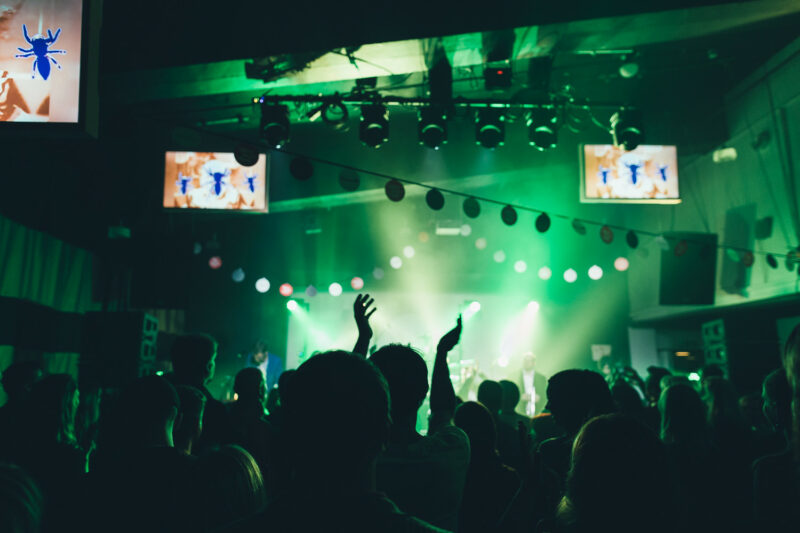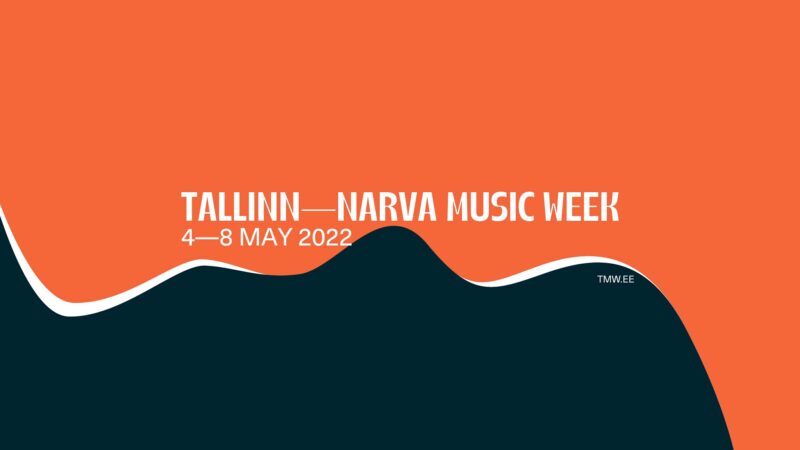Tallinn, the city at Estonia’s coastline is hosting the 14th international Tallinn Music Week this year. After being selected as one of the UNESCO World Heritage sites of Music, the Estonian capital will host 175 across genres, from 28 countries to celebrate “tomorrow’s music, arts, and ideas” as well as highlight the traditional Estonian music culture. The lineup was recently announced and joins an impressive cross-genre mix. On various stages across the city the diversity of sounds will be celebrated, exploring Finno-Ugric heritage sites, to jazz clubs, to showcases bringing together culture and technology at the Spot Stage.
“As the capital, Tallinn is the largest center of music culture in Estonia. Historical organs alongside modern experimental electronic music are part of the local scene. It is home to many artists, clubs, event series, promoters and international festivals, Therefore it is also a great breeding ground for emerging talent.”
Bridges Between Tallinn and Narva
What makes this year especially unique is the two-city focus of the festival. For the first time the TMW is hosted not just in Tallinn but also in Narva, the easternmost town of the country. The inclusion of the city where the European Union starts was a conscious decision in the face of the ongoing invasion of Russia in the Ukraine. “On 24th February the world changed. And it concerns us all”, explains Helen Sildna, the founder and director. The split between locations is a statement of solidarity in the face of the war to show that the city separated from Russia by just a bridge is safe and will stand strong.
“We hope that it will be a unifying and insightful experience proving that music and culture can bring collaboration and solidarity. We are all connected. Unity is our defense.”
Art As Resistance
Resistance through music and through art is the heritage the Estonian festival carries on. The country is famous for its Singing Revolution – the mass demonstrations that took place in Tallinn in 1988-91 under Soviet occupation. The festival organizers are very aware of the power of music in times of crisis and explain that the revolution made “it possible for people to express their views in a peaceful way and helping to legitimize political decisions that lead to the non-violence regaining of Estonia’s independence”. It is part of the legacy that the two-city focus of the TMW celebrates as well.
Founded in 2009 with the aim “to make Estonian music more visible internationally” in a country with the small population of 1.3 million people, the Tallinn Music Week was set up as a connector. The 2022 edition of the festival aims at continuing that tradition of using music and art as a tool for exchange and communication.
Then the World Changed
In an interview Ingrid Kohtla, Head of PR and co-curator of the TMW, tells us that the Russian invasion on the 24th of February of course has its repercussions in the neighbouring country as well. Her story, like the eastern city and second festival ground, Narva, has close ties to Russia. “I was born in Kohtla-Järve in Ida-Viru County in the heyday of local oil shale and phosphorite mining. and later, spent many school breaks in this predominantly Russian speaking industrial town. So, of course, I soaked up the language as well as some insight into Russian culture and psychogeography. During the past few years, I paid several visits to Russia, had a blast at festivals like Moscow Music Week, and discovered dozens of brilliant acts, many of whom we also introduced at TMW. Until the world changed in February.”
“Our thoughts are not just with everyone in Ukraine, fighting for their lives in an unjust war by the Russian regime but also with our friends, artists, and partners in Russia, many of them risking their lives protesting.”
She goes on to explain the message of artistic resilience and resistance inherent to Estonian music culture on the individual and societal level that TMW promotes. During another local music festival, the Station Narva Festivals, which is held and organized by the same company (Shiftworks) since 2018, “we experienced there that music can really bring people together allowing them to understand their own view of reality as well as the experiences of others. It underlines common ground and communicates in both directions. It would be foolish to suggest that all mental anguish and tragedies can be remedied by the arts, but it would also be foolish to ignore its psychologically critical opportunities to bring solace and inspire feelings of hope and unity.”
With Ukraine
Aside of the two-city focus of the TMW 2022, the festival also introduced initiatives to support Ukrainian musicians like a new artist residency program for Ukrainian musicians. The two-month sound residency allows artists to live, work, and create in Tallinn. Recipients are FO SHO, Gentle Ropes, and Krapka;KOMA. Alongside the celebration of Ukrainian music and culture, the festival will also provide an opportunity for children from families who have been displaced because of the war, to take part in the TMW’s kids and youth co-creation workshop.
“Societal cohesion is one of the prerequisites for us, so it is not enough to have loads of military power — society and individuals must also be cohesive to stay resilient during crisis.”
After the invasion, the festival committee contacted all Ukrainian artists who had confirmed their performances at TMW before the war. Some of them are still able to play, others have hopes for the next year. One of the biggest names in the Ukrainian pop scene, Ivan Dorn, will be opening the festival on May 5th at the capital.
TMW as a Connector
“The TMW is designed to connect – with love, courage, know-how, hard work, sharp sight and a bit of luck”, Ingrid Kohtla says. Following that mindset, the festival hosts over 1000 industry professionals from all over the world and combines local acts with international artists to provide contacts and connections. “The best things often happen when people and minds collide”, she goes on, telling us about the international collaborations between artists that grew out of previous editions of the festival.
“But TMW’s main focus is on Estonian artists.” In the country the musical tradition is ever-present, whether it is through the teachings at several colleges, through arts programs or through the success stories of contemporary acts, who draw from their musical heritage. Bands like Trad.Attack! or Mari Kalkun use ancient Estonian and Võru traditions and form their roots to contemporary artistry appreciated on the global scale. The showcase in celebration of the Fenno-Ugric tradition highlights the beautiful intersection of tradition and contemporary art and kicks off the United Nations International Decade of Indigenous Languages (2022-32) that aims to uplift lesser-known and endangered languages.
Bending Questions of Social and Cultural Identity
For the past 13 editions of the festival, Tallinn has functioned as the vessel for the local music scene and development of micro-genres within. “Even during Soviet times, Tallinn was not entirely behind the Iron Curtain. We watched Finnish TV and listened to private radio stations here”, Kohtla remembers. The resilient character of the Estonian city makes it the perfect playground for international and local acts to mingle and to connect.
As some of the most interesting acts to look forward to this May, the curator names the Africa NOW! Night featuring bright new voices from different parts of Africa and its diaspora, in resistance to colonialist cliché and the obsolete definition of “World Music”. The TMW is co-curated by local and international promoters, labels, and music organizers, which gives it the ability to host unique and well-curated showcases from all over.
“It is about creating and fostering our little global models, forward-looking and fluid identities. We offer a springboard for adventurous music. from all sorts of contemporary scenes, but also from more traditional fields, post-classical, jazz, Estonian trademark choral music. It is about not doing it the established way but feeding off questions of cultural and social identities.”
Talks and Talents

Previous TMW
From the 4th to the 8th of May the Tallinn Music Week will host showcases curated by genre, scene, BPM, label or specific sound of a generation. Across several stages, venues and across two cities, the festival will combine unique talents of diverse backgrounds to “discover, nurture, and empower new talent and to make music more accessible for everybody”. The musical celebration will be accompanied by panel talks and discussions on regional markets and global networks and how to improve policies. As well as in-depth talks on the impact of music and arts on social empowerment, diversity, and social justice – the core ideas of the TMW.
Some other events and artists to look forward to include the Soda POP Night uniting shameless hedonists, glitches and new ideal pop formulas, the live stream of the music and video production house Ö studios curating an evening of collisions between experimental and institutional, Estonian and Finnish indie bands Röövel Ööbik and 22-Pisterpirkko, Arvo Pärt’s compositions by the Estonian Philharmonic Chamber Choir at the opening of the Narva music program. At the conference former Cocteau Twin, Simon Raymonde will speak, alongside Jane Savidge, famed instigator of the Britpop movement, Icelandic music veteran Sigtryggur Baldursson, and representatives from Ljubljana’s MENT festival.
Tickets are still available for the festival week. To get into the groove, check out the various playlists curated by the TMW Team featuring artists that will play.



